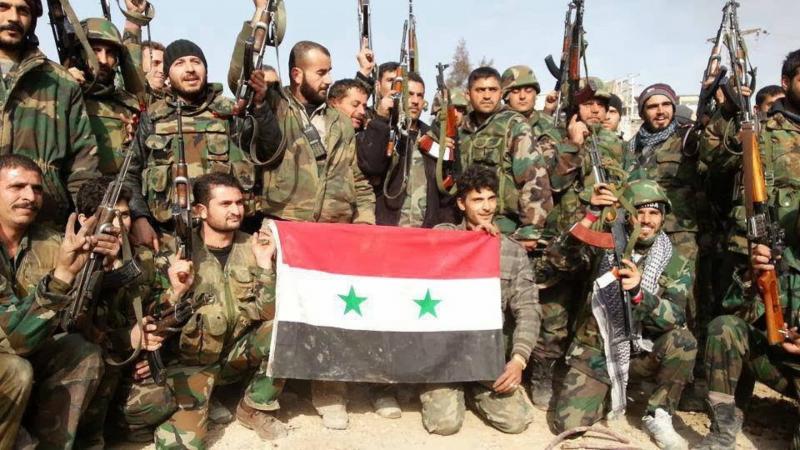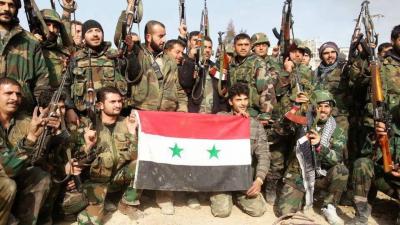In a report published in "Foreign Policy," the author states that "after years of the civil war ending in the country, Assad's grip is once again beginning to unravel. Six years ago, the Syrian regime seized the southern province of Daraa, popularly known to millions of Syrians as the 'cradle of the revolution,' after besieging it with Russian support and turning it into rubble, all under an American umbrella. This military victory represented a pivotal moment for Syrian President Bashar al-Assad, marking the last time the regime captured a large area from the opposition, with Daraa being classified as a de-escalation zone following months of intensive international diplomacy led by the United States."
The writer adds, "For many, that moment symbolized a victory for Assad and the end of the Syrian crisis, containing its repercussions. However, in reality, Assad has never 'won'; he only survived, thanks to the continued strong support from Russia and Iran on one hand and a withdrawal of international involvement on the other, as the world's interest in working to resolve the excruciating crisis in Syria has evaporated."
The "Foreign Policy" author mentions that the situation in Syria, in many ways, is worse than it was before. There are clear and ongoing signs of ISIS's resurgence; a multi-billion dollar international drug trade connected to the regime; and ongoing geopolitical hostilities involving Israel, Iran, Turkey, Russia, and the United States, amid a weakening hold of the regime over the areas it controls.
In this context, southern Syria presents a prominent example, as after six years of bombarding the cradle of the revolution and subduing it, Assad's rule in the south is beginning to erode. While Assad and his Russian patron intended for the south to embody a "stable Syria" that had been "cleansed" of opponents, the region has turned into the most unstable area since 2018. Between mid-June and mid-July alone, at least 47 people were killed in the provinces of Daraa and Suwaida through assassinations, ambushes, raids, kidnappings, and daily executions of hostages. Daraa, in particular, today exemplifies security breakdown and chaos.
According to information, former opposition fighters and other local armed factions in the regime-controlled southern provinces of Daraa and Suwaida have recently become bolder in challenging the regime's violations. From mid-June to mid-July, armed fighters—mostly former opposition members—kidnapped at least 25 Syrian military officers in retaliation for the regime’s arbitrary detention of civilians in their areas. These hostages were then successfully used as leverage to pressure the regime into releasing detained civilians. This form of challenge was unprecedented, forcing the regime to yield.
Local armed factions, which are considered "reconciled" in form, have now also started launching direct attacks on regime checkpoints and military buildings in response to violations. For instance, when a Syrian woman from the town of Inkhil in Daraa was arrested while trying to renew her passport in Damascus on July 10, former opposition fighters in Inkhil coordinated attacks on three regime checkpoints and the local intelligence headquarters. When the regime forces responded with gunfire, including mortar and artillery fire, local fighters set an ambush for an armored military vehicle that arrived as reinforcements, destroying it with rocket fire. Later that same day, the woman was released.
In the neighboring province of Suwaida, where locals organized over 330 consecutive days of protests demanding Assad's ousting, Syrian forces unexpectedly established a new security checkpoint at the main entrance to the provincial capital on June 23. As a result, local armed factions mobilized and launched attacks on regime sites, engaging in fierce fighting that lasted 48 hours, drawing in regime reinforcements from Damascus. By June 25, the Syrian army had to retreat, turning the checkpoint into a site without local authority. Such a direct challenge to the regime's security policy was striking, especially for a province that has never been under the opposition's control.
This incident attracted significant regional attention and highlighted the regime's surrender. This may explain the assassination of one of the leading anti-regime armed group leaders in Suwaida - Commander of the Mountain Brigade, Marhaj al-Jurmani - who led many of the aforementioned attacks, at his home during the early hours of July 17, where he was shot in the head through the window of his living room by a hired killer equipped with a silencer. His wife, who was present in the house, did not hear the gunfire.
According to the writer, "Such insights offer a glimpse into the real situation of the regime’s rule in the fourteenth year of the Syrian crisis. Far from consolidating its control, Assad's authority appears to be collapsing. Meanwhile, the regime continues to fail in its sporadic efforts to challenge the resurgent ISIS."




